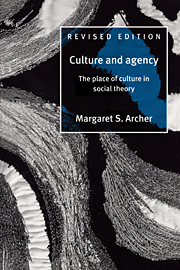Book contents
- Frontmatter
- Contents
- Preface
- 1 The Myth of Cultural Integration
- Part I Rejecting cultural conflation
- Part II Reconceptualizing cultural dynamics
- 5 Addressing the Cultural System
- 6 Contradictions and complementarities in the Cultural System
- 7 Socio-Cultural interaction
- 8 Elaboration of the Cultural System
- 9 Towards theoretical unification: structure, culture and morphogenesis
- 10 ‘Social integration and System integration’
- Notes
- Index
6 - Contradictions and complementarities in the Cultural System
Published online by Cambridge University Press: 02 December 2009
- Frontmatter
- Contents
- Preface
- 1 The Myth of Cultural Integration
- Part I Rejecting cultural conflation
- Part II Reconceptualizing cultural dynamics
- 5 Addressing the Cultural System
- 6 Contradictions and complementarities in the Cultural System
- 7 Socio-Cultural interaction
- 8 Elaboration of the Cultural System
- 9 Towards theoretical unification: structure, culture and morphogenesis
- 10 ‘Social integration and System integration’
- Notes
- Index
Summary
This chapter focuses on the second of the four propositions which are explored throughout Part II:
(i) There are logical relationships between components of the Cultural System (CS).
(ii) There are causal influences exerted by the CS on the Socio- Cultural (S-C) level.
(iii) There are causal relationships between groups and individuals at the S-C level.
(iv) There is elaboration of the CS due to the S-C level modifying current logical relationships and introducing new ones.
As will be shown in this chapter, the result of adopting a dualistic approach is that when examining the effects of the Cultural System (CS) the analysis still remains largely ‘unpeopled’. Nevertheless our prime interest in the Cultural System lies precisely in its two-fold relationship with human agency; that is with its effects upon us (those logical properties which affect people) and our effects on it (how people form and transform its logical properties). In the first case, analytical dualism means that we will be discussing the conditional effects (on people) of the System; in the second case, the logical consequences (of people) on the System. Analytical, as opposed to philosophical, dualism is an artifice of convenience. Even artificially it cannot completely depopulate the cultural world and sociologically it would not be advantageous to do so. Thus when we examine Systemic influences upon us, human agency appears as a ghost in the machine; on the other hand, the investigation of our cultural products views ghostly agents as creating the machine.
- Type
- Chapter
- Information
- Culture and AgencyThe Place of Culture in Social Theory, pp. 143 - 184Publisher: Cambridge University PressPrint publication year: 1996



